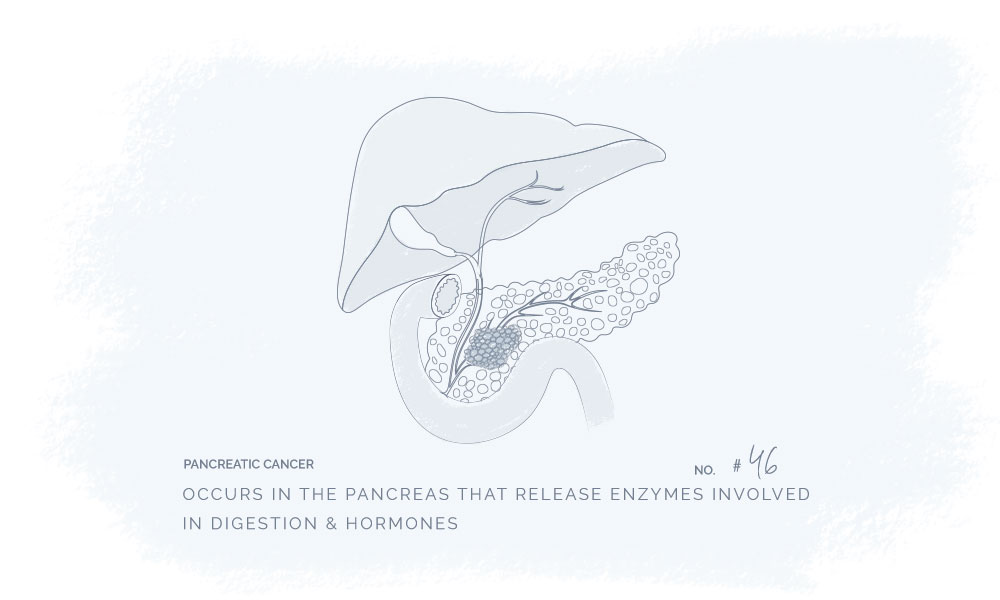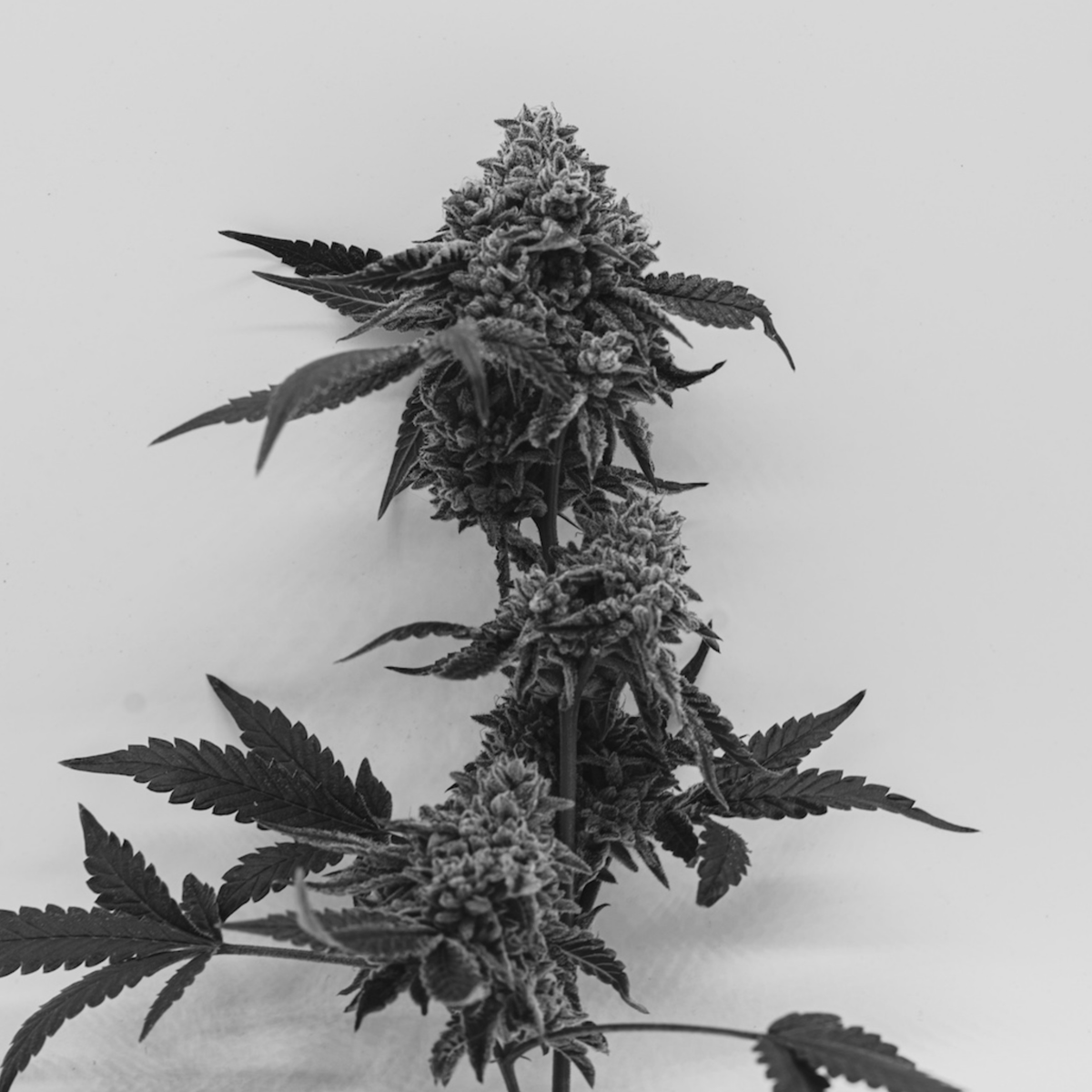
Pancreatic Cancer
Cancer

What is Pancreatic Cancer
Pancreatic Cancer occurs in the tissues of the pancreas which is an organ in the abdomen involved in releasing enzymes that help with digestion and production of hormones.
Symptoms
There is a lack of symptoms in the early stages of the disease and cancer often spreads to other parts of the body before it is detected. However, common symptoms may include:
- Back pain
- Unintended weight loss
- Loss of appetite
- Jaundice, yellowing of the skin
- Pale colored feces
- Dark-colored urine
- Itchy skin
- Blood clots
- Fatigue
- Aggravation of diabetes or detected new diagnosis of diabetes
Cause
Currently, the exact cause of Pancreatic Cancer is not clear. Factors that may increase the risk of this cancer are smoking and certain genetic mutations. As other types of cancer, Pancreatic Cancer involves the growth of abnormal cells that contain mutations leading to uncontrollable cell division and growth. Similarly, it can spread and damage/destroy normal tissue.
The most common types of pancreatic cancer form in the cells lining the ducts of the pancreas and are referred to as pancreatic adenocarcinoma or pancreatic exocrine cancer. Cancer can also begin in the hormone-producing cells and/or neuroendocrine cells in the pancreas. These types of cancer are less common and are known as pancreatic neuroendocrine tumors, islet cell tumors, or pancreatic endocrine cancer.
Pancreatic Cancer Symptoms
Often symptoms like back pain, unintended weight loss, and jaundice do not appear until cancer has spread to other parts of the body.
Therapeutic Potential
Preclinical data suggests the ECS can be involved in the development of Pancreatic Cancer and THC may be therapeutic in treatment.
Application options
Depending on your needs, the optimal type of application may vary. Find more information on our application options.
The connection between Cannabinoids & Pancreatic Cancer
Studies find that CBD and THC may have great therapeutic potential and may be used to help treat Pancreatic Cancer. CBD and THC are well-known cannabinoids, however, they do not have the same psychoactive effects. THC is psychoactive while CBD does not possess psychoactive effects. According to WHO guidelines, the cannabidiol CBD is generally well tolerated with a good safety profile.
Preclinical evidence proposes that the endocannabinoid system may play a role in the development of pancreatic cancer and that cannabinoids like THC may exhibit anti-tumoral properties. In addition, cannabinoids may be beneficial in treatments supplementing chemotherapy as cannabinoids appear to enhance the effect of the treatment.
It was shown that endogenous cannabinoids play a role in reducing tumor invasion and growth, promoting tumor cell death, and suppressing tumor angiogenesis through cannabinoid receptor or receptor-independent pathways.

Literature Discussion
The literature discussion is an overview of the published results from scientific studies investigating if and how cannabinoids can be beneficial in the treatment of Pancreatic Cancer. The overview will be updated regularly to ensure the newest and most accurate information.
THC may effectively kill pancreatic cancer cells
In one study, it was shown that pancreatic cancer cells (MiaPaCa2, Panc1, Capan2, and BxPc3 cell lines) can effectively be killed by THC (2 μM and higher concentrations).Furthermore, the authors found that both cannabinoid receptors CB1 and CB2 are expressed by the pancreatic tumor biopsies and cell lines. In mice, the growth of pancreatic tumor cells can be decreased by THC (15 mg/kg/d). Also, THC was seen to induce apoptosis of pancreatic cells.
The ECS and cannabinoids receptor may play a key role in Pancreatic Cancer
In human pancreatic cancer cells (MIA PaCa-2), it was shown that cell death can be triggered by various agonists and antagonists via a receptor-independent mechanism.
In human patients, decreased survival was connected to the high expression of CB1 in pancreatic cancer cells. Similarly, decreased survival was connected to low levels of endocannabinoid-degrading enzyme FAAH and MAGL. Furthermore, levels of Anandamide and 2AG were found to be unaffected in pancreatic cancer. Finally, increased survival and strong pain symptoms were found to be connected to low CB1 receptor levels in nerves. More research is needed to elucidate the mechanistic value of these correlations.
CB1 and CB2 may synergistically suppress pancreatic cancer cells with an anti-cancer drug
AMP-kinase and ROS-dependent autophagy of cancer cells can be triggered by cannabinoids specific for the CB1 (ACPA) and CB2 (GW) receptors in Panc1 cells.
Combination of CB1 and CB2 antagonists with the anti-cancer drug Gemcitabine synergistically suppressed pancreatic adenocarcinoma cell proliferation and enhanced intracellular ROS production.
Clinical Trials
Clinical trials are research studies that examine new treatments and evaluate their effects on human health outcomes.
Today, we are not able to provide any clinical trials about cannabinoids and Pancreatic Cancer.
Cannabinoids & Receptors
Below you find the plant cannabinoids, cannabinoid receptors, and endocannabinoids that are associated with the potential therapy.
CBD
Cannabidiol (CBD) is a dominant cannabinoid in hemp. CBD does not possess psychoactive effects and does not make people high. CBD has been demonstrated to have potential as an alternative for several health-related conditions, including anxiety, pain, depression, among others.
THC
Tetrahydrocannabinol (THC) is a cannabinoid found in the cannabis plant. THC possesses psychoactive properties.
CB2
Cannabinoid receptors are located on the surface of cells in your body and they “listen” to conditions outside the cell. CB2 receptors are key players in the ECS. CB2 receptors are more abundant outside the nervous system, including cells of the immune system.
If you have any further information relevant to the connection between Pancreatic Cancer and cannabinoids or find any of the information inaccurate, outdated or incomplete please contact us here
References
- https://www.mayoclinic.org/diseases-conditions/pancreatic-cancer/symptoms-causes/syc-20355421
- https://ghmedical.com/endocannabinoid-system/diseases/pancreatic-cancer
- Sharafi, G., Et Al., (2019). ” Potential Use of Cannabinoids for the Treatment of Pancreatic Cancer”. https://www.ncbi.nlm.nih.gov/pmc/articles/PMC6352507/pdf/pancan.2018.0019.pdf
- Carracedo, A., Et Al., (2006). “Cannabinoids induce apoptosis of pancreatic tumor cells via endoplasmic reticulum stress-related genes”. https://pubmed.ncbi.nlm.nih.gov/16818650/
- Fogli, S., Et Al., (2006). “Cannabinoid derivatives induce cell death in pancreatic MIA PaCa-2 cells via a receptor-independent mechanism”. https://pubmed.ncbi.nlm.nih.gov/16500647/
- Michalski, C.W., Et Al., (2008). ” Cannabinoids in pancreatic cancer: correlation with survival and pain”. https://pubmed.ncbi.nlm.nih.gov/17943729/
- Dando, I., Et Al., (2013). “Cannabinoids inhibit energetic metabolism and induce AMPK-dependent autophagy in pancreatic cancer cells”. https://www.ncbi.nlm.nih.gov/pmc/articles/PMC3698539/
- Donadelli, M., Et Al., (2011). “Gemcitabine/cannabinoid combination triggers autophagy in pancreatic cancer cells through a ROS-mediated mechanism”. https://pubmed.ncbi.nlm.nih.gov/21525939/
